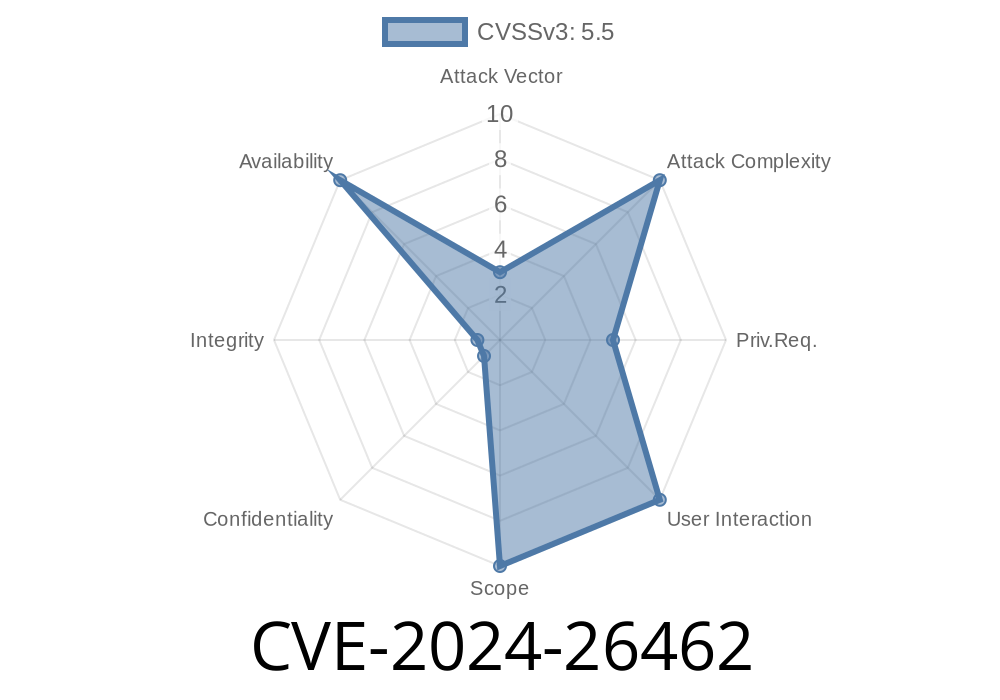In early 2024, the Kerberos 5 (krb5) team disclosed a new vulnerability: CVE-2024-26462. This bug, found in krb5 version 1.21.2, exposes a dangerous memory leak in the ndr.c file within the Key Distribution Center (KDC) component. In this article, we'll cover what this vulnerability is, why it matters, show you relevant code, and point you to further technical resources.
What is Kerberos and krb5?
Kerberos is a well-known network authentication protocol used by universities, enterprises, and governments worldwide. The krb5 software is the most common open-source implementation, securing millions of users on a daily basis.
The Heart of the Issue: Memory Leaks
A memory leak happens when a program reserves memory ("allocates") but never gives it back ("frees") after it's done using it. Over time, this can consume all available system memory, slow down the server, or cause it to crash. In a critical security service like the KDC, stability and security are top concerns.
Affected version: krb5 1.21.2 (and possibly other versions)
- File: /krb5/src/kdc/ndr.c
What triggers the bug?
If the KDC receives certain crafted requests, the vulnerable code path is reached inside the ndr.c file. Instead of cleaning up after itself, the function leaks memory every time this path is used. Malicious users can exploit this by sending lots of requests and eventually take down the KDC.
Code Snippet: The Vulnerable Path
Let's look at the type of bug involved. Here's a simplified, illustrative code snippet inspired by the vulnerable logic:
// In ndr.c (simplified pseudocode)
void process_ndr_data(request_t *req) {
ndr_struct *ndr = malloc(sizeof(ndr_struct));
if (!ndr) return; // allocation failed
// ... do some processing ...
if (bad_request(req)) {
// Oops! We forgot to free 'ndr' here.
return; // Memory leak
}
// ... further processing ...
free(ndr); // Only freed if bad_request is false
}
Key Problem:
If bad_request(req) is true, the function leaves via return without freeing the memory it allocated with malloc. If an attacker keeps sending bad requests, memory usage grows until the service is overwhelmed.
Impact
- Availability Risks: KDC servers may crash or become unresponsive, denying access to network users.
While krb5 developers haven't released a full proof-of-concept, exploitation is straightforward
1. Write a script that sends malformed requests (as per what triggers the leak).
Example pseudo-Python exploit pattern
import socket
target = ("kdc.example.com", 88)
bad_payload = b'\x00\xab...' # Malformed payload that triggers leak
s = socket.socket(socket.AF_INET, socket.SOCK_DGRAM)
while True:
s.sendto(bad_payload, target)
# No response needed, just keep sending
Warning: This is just a sketch. Testing against unauthorized servers is illegal!
Fixes and Mitigations
The krb5 team has released a patch that ensures all memory allocations are properly freed—no matter how the function exits.
References
- MIT Kerberos / krb5 Security Page
- CVE-2024-26462 NVD entry
- GitHub krb5 Repository
- Patch Commit Example (Upstream)
Conclusion
CVE-2024-26462 is a significant, high-impact bug for anyone running the Kerberos 5 KDC. While this bug doesn't allow tripping up authentication directly or leaking credentials, it is a classic Denial-of-Service weakness. Regularly update your Kerberos systems and watch for such advisories. It's always better to stay up to date than to face an unexpected outage!
Stay secure, and share this article if your organization relies on krb5. If you have any questions on mitigation, let us know in the comments below!
Timeline
Published on: 02/29/2024 01:44:18 UTC
Last modified on: 02/14/2025 17:29:03 UTC
